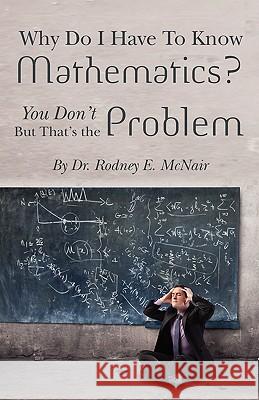Why DO I have to Know Mathematics: You Don't- But, That's the Problem » książka
Why DO I have to Know Mathematics: You Don't- But, That's the Problem
ISBN-13: 9781456588083 / Angielski / Miękka / 2011 / 228 str.
High school and college students are in a position to benefit most from the understandings provided by this book. These students are currently taking mathematics classes and studying in other content areas and so they have an opportunity to apply the understandings they will develop in the book to their current understanding of the mathematics they are being taught. They will also be in a position, like the rest of us who have finished our formal educations, to begin to ask the quantitative questions that lead to a need to know and understand mathematics. Asking and being able to answer these quantitative questions is the key to being competitive in our new knowledge based economy. Many people have asked why they have to know mathematics. "Why Do I Have to Know Mathematics? You Don't But that is the Problem" provides an answer that establishes a direct link between mathematics and your life. After reading the book you will know exactly why mathematics is important and in particular why it is important to you. Once you have the answer you will be faced with another more important question. Why haven't I been using mathematics? Mathematics is used to develop understanding. There are many ways to understand something, however, quantitative understandings developed through the use of mathematics are particularly important when it comes to understanding how and why thing change. The question that you must ask is what is it that I want to understand? Your answer to this question is the fuel you will need to truly understand the power of mathematics. Everything changes. Mathematics is the most powerful subject you will study in school because it gives you the power to understand change. Our society has become a complex system of measurements and predictions that are used to manage changes in our physical and social environments. Health care systems, economic systems, banking systems, and environmental systems are measured and managed for the best interests of those doing the managing. If you are not able to participate in the quantitative discussion of these measures and predictions then you are at the mercy of those who do. This book provides the foundational understanding you will need to take your first steps toward developing your ability to use the power of mathematics so that you can participate in the discussions that are shaping your present and future physical and social environments.
Zawartość książki może nie spełniać oczekiwań – reklamacje nie obejmują treści, która mogła nie być redakcyjnie ani merytorycznie opracowana.











